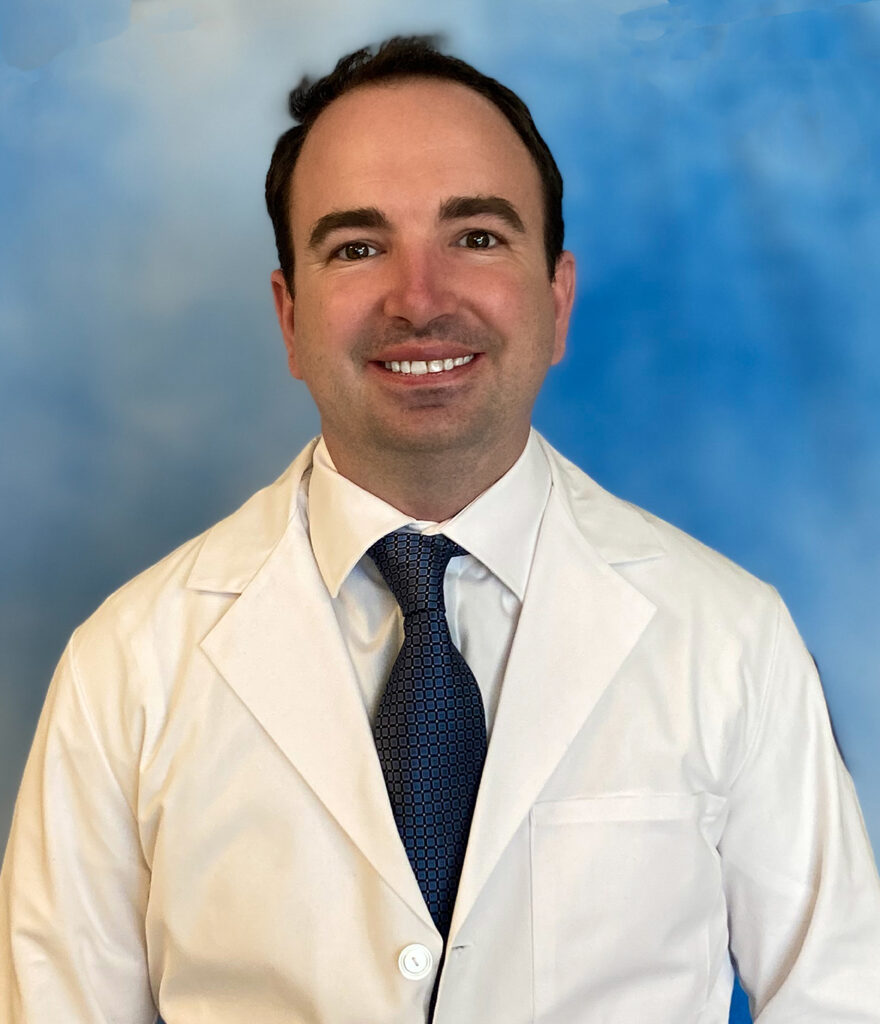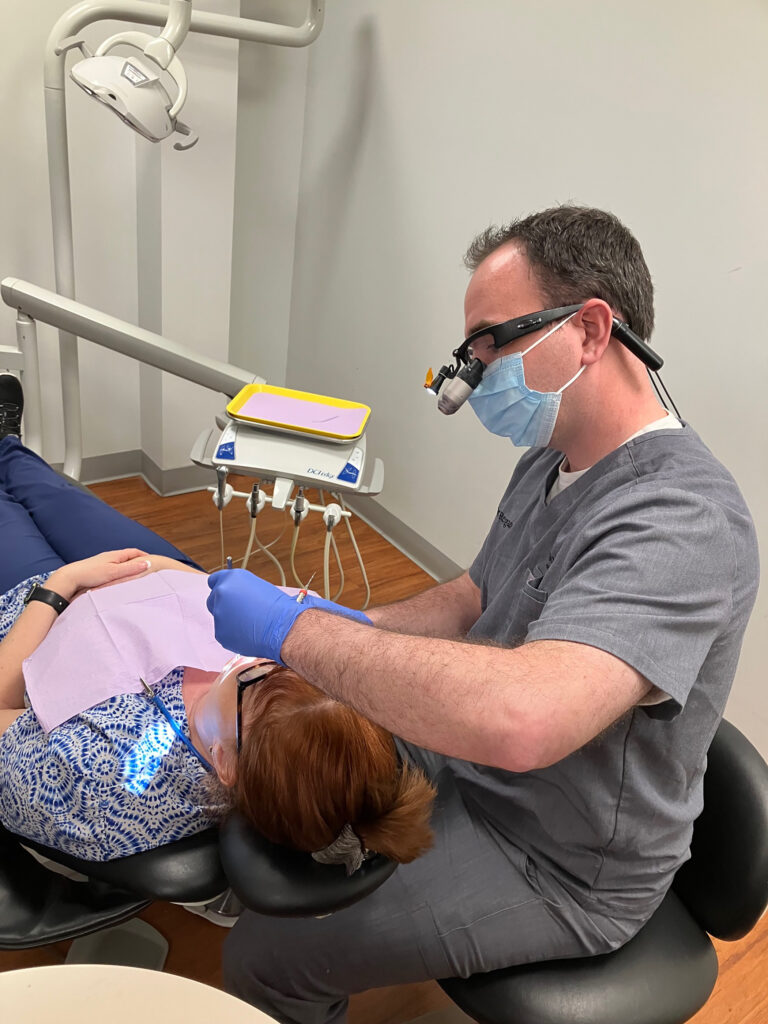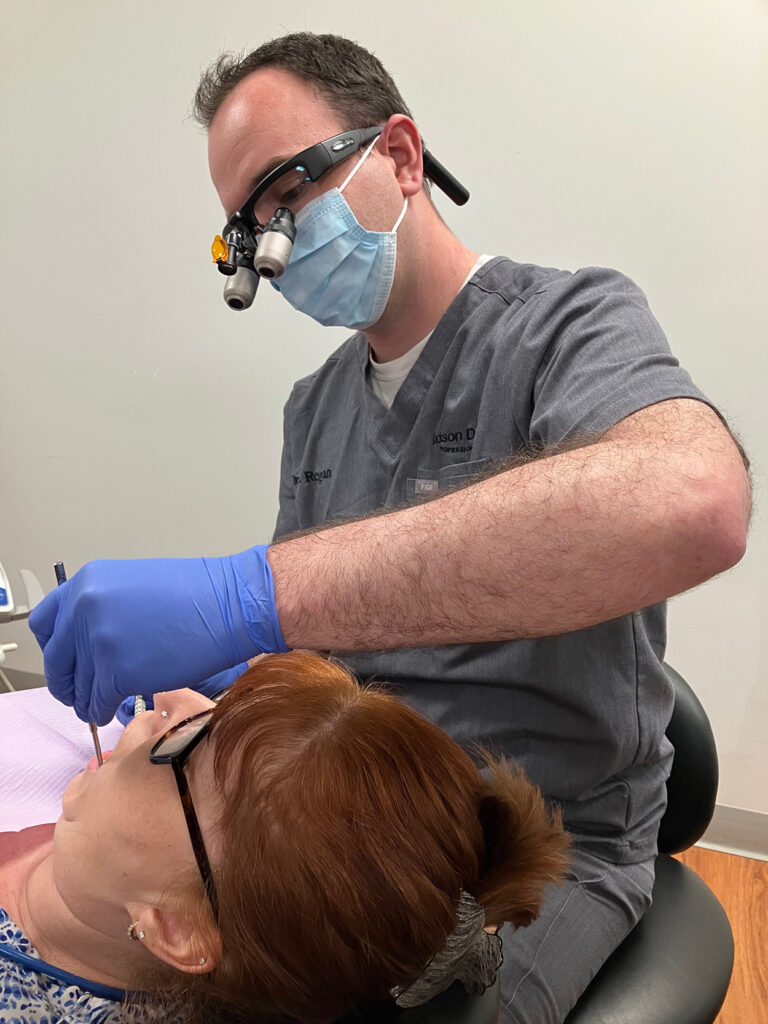Mission accomplished: Wright Center-trained dental resident joins staff to provide high-quality oral care services

Dr. Michael Regan will complete his postdoctoral Advanced Education in General Dentistry residency in July at The Wright Center for Community Health, the sole affiliate in Pennsylvania for NYU Langone Health’s Dental Medicine Postdoctoral Residency Program.
Dr. Michael Regan was on a one-year plan when he selected The Wright Center for Community Health for his postdoctoral Advanced Education in General Dentistry (AEGD) residency through its partnership with NYU Langone Health’s Dental Medicine Postdoctoral Residency Program.
His goal was to obtain a required New York State license after completing the yearlong AEGD program in June to become a primary oral health care provider just over the Pennsylvania border in Broome County, New York, where his parents live.
But after working closely with The Wright Center’s dental staff as part of the program’s advanced hands-on training, he cannot imagine delivering oral health services elsewhere.
“I’m not leaving when I finish my residency,” says Regan, 30, a Hershey, Pennsylvania, native who received his doctoral degree in dental medicine from Midwestern University College of Dental Medicine-Arizona. “I’m going to be leading a team of dental practitioners at the Wilkes-Barre Practice.”
The Wright Center rolled out weekly dental services in its downtown Wilkes-Barre Practice in July 2023 and will begin providing daily dental care on Monday, Aug. 5, when Regan starts his new job. The facility at 169 N. Pennsylvania Ave., Wilkes-Barre, will offer dental services from 8 a.m. to 6 p.m. Monday through Friday.
Regan, his wife, Lydia, who is a physician assistant, and their two golden retrievers, Keta and Huckleberry, will relocate to a community near Wilkes-Barre from Conklin, New York, where they live in a log cabin Regan’s family built and where he spent weekends as a child.
Regan’s change of heart also stems from seeing firsthand the growing need for dentists in Northeast Pennsylvania and developing solid skills while providing affordable, high-quality oral care in The Wright Center’s state-of-the-art dental clinics at its Scranton and Mid Valley practices and on its Driving Better Health mobile medical and dental vehicle.
The skills learned from working closely with Dr. Caitlin McCarthy, program director for The Wright Center’s AEGD residency program, are unmatched elsewhere, he says. Regan also praises the other Wright Center employees he works with, including Jimmy Browder, dental assistant; Melika Mokhtari, lead expanded function dental assistant; Frances Frankovsky, certified dental assistant; and Bernadette Lukasik and Dan White, both public health dental hygienists.

Dr. Michael Regan will provide daily dental care with a team of providers at The Wright Center for Community Health Wilkes-Barre Practice beginning on Monday, Aug. 5.
“The dental team is great here,” says Regan, an adventurer at heart who worked as a professional dive leader during a 2017 internship in Roatán, Islas de la Bahía, Honduras, and at Taku Smokeries Fish Processing facility in Juneau, Alaska in 2018. He also was a Midwestern University Dean’s Research Fellow from 2019-21, researching how adding silver to bioactive glass, which is a bone grafting material used in dentistry, kills bacteria and helps patients heal faster.
Regan chose The Wright Center from nearly 80 AEGD program training sites also affiliated with the Brookyln, New York-based NYU Langone. The world’s largest postdoctoral dental residency program of its kind, the NYU Langone program trains about 400 residents annually at partner sites, such as hospitals, private dental practices, and community health centers, in nearly 30 states. The Wright Center, the AEGD program’s sole Pennsylvania affiliate, has hosted two dental residents each academic year since becoming a program partner in 2021.
“I wanted to work at a public health center close to my hometown, and The Wright Center is the only training site in Pennsylvania for the program,” Regan says of the NYU Langone program. “My hope was to become a more well-rounded provider and practice comprehensive dentistry. One of the biggest benefits of The Wright Center’s program has been developing a skill set that you wouldn’t get elsewhere.”
It is Regan’s passion to be the best dentist he can be that makes him stand out, says McCarthy. “He didn’t have to do this residency,” she says. “The residency is not a requirement to practice dentistry in Pennsylvania or most other states. But he wanted to do it to learn as much as he could to be a better dentist.”
As part of the program’s clinical curriculum requirement that meets the Commission on Dental Accreditation (CODA) standards, 80% of the residency – a minimum of 40 hours a week for 52 weeks – is spent providing comprehensive general dentistry treatment and services to Wright Center patients.

As part of his postdoctoral Advanced Education in General Dentistry residency, Dr. Regan treated dental patients at The Wright Center for Community Health Scranton and Mid Valley practices.
The vast training and experience for resident dentists include: acting as primary oral health care providers; collaborating effectively within interdisciplinary health care teams; coordinating patient-focused care under the supervision of a general practitioner or specialist; directing health promotion and disease prevention activities; assessing, diagnosing, and planning multidisciplinary oral health care for various patients; managing the delivery of patient-focused oral health care; and providing specific dental treatments and services such as restorative dentistry, fixed and removable prosthodontics, periodontal, and endodontic therapies, oral surgery, dental emergencies, and pain/anxiety control techniques.
The remaining 20%, or about 250 hours, is coursework, such as monthly lectures The Wright Center offers to enhance residents’ education, online presentations, and live video sessions with other program residents throughout the United States, Puerto Rico, and the U.S. Virgin Islands.
Topics include oral health care for pediatric, geriatric, medically compromised, and special needs patients and the latest information on dental procedures and practice management.
The Accreditation Council for Graduate Medical Education (ACGME) also accredits all residency and fellowship programs at The Wright Center for Graduate Medical Education. The ACGME has its own quality standards for medical education. The Wright Center’s AEGD program complies with both CODA and ACGME requirements.
Much of what is learned through the AEGD program, such as advanced oral surgical and endodontic techniques, is not taught in dental school.
“The aim of the AEGD program is to give new graduates more experience with procedures that are more involved or a greater number of procedures than you get in graduate school,” says McCarthy. “Since we started offering the program, the residents have greatly exceeded the number of procedures and CODA requirements.”
Regan and the dental team see patients from 8 a.m. to 5 p.m., Monday through Friday at The Wright Center for Community Health Scranton Practice.
“It’s about eight to 20 patients a day,” he says. “We do a ton of surgeries – 10 times a day, every day of the work week.”
Individual circumstances have resulted in many patients not taking proper care of their teeth, causing them pain and infections, he says.
“The best thing about dentistry is being able to take people out of pain,” Regan says. “A lot of dental practices don’t take all the state insurance (plans) like we do.”
To ensure high-quality oral care is available to everyone, The Wright Center, a Federally Qualified Health Center Look-Alike and safety-net provider, also offers a sliding-fee discount program to those who qualify based on federal poverty guidelines that take family size and income into account. No patient is turned away because of an inability to pay.
The Wright Center’s hands-on training has also inspired Regan to think outside the box to try to simplify and shorten procedures. For example, he is researching grants to purchase digital implant technology that uses 3D computer models of the jawbone for a more precise placement and quicker procedure.
“There’s such a great need for dentists in the region,” he says. “A lot of people have had a bad experience with their dental provider, or they can’t afford dental care. That’s not the case here. The Wright Center provides quality dentistry at a great rate.”








